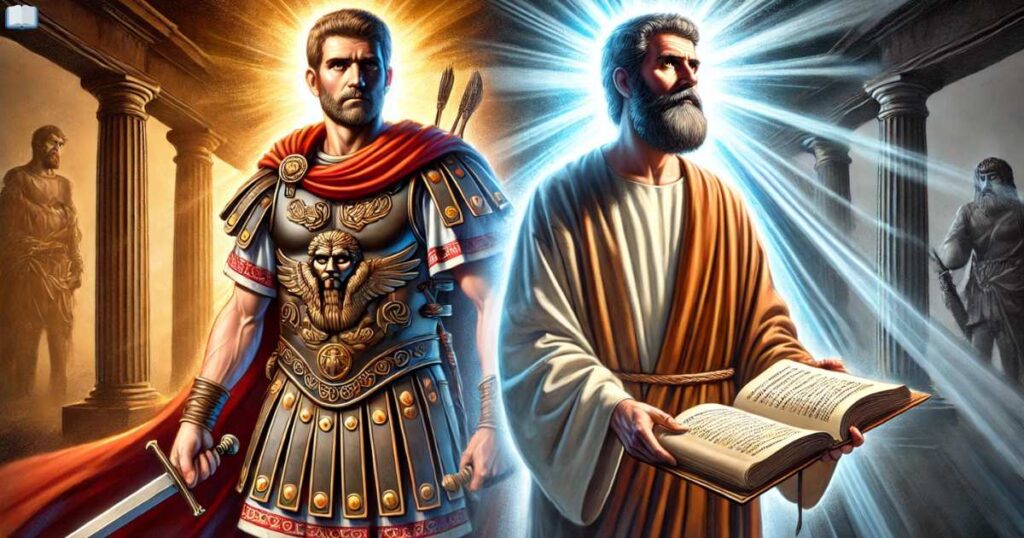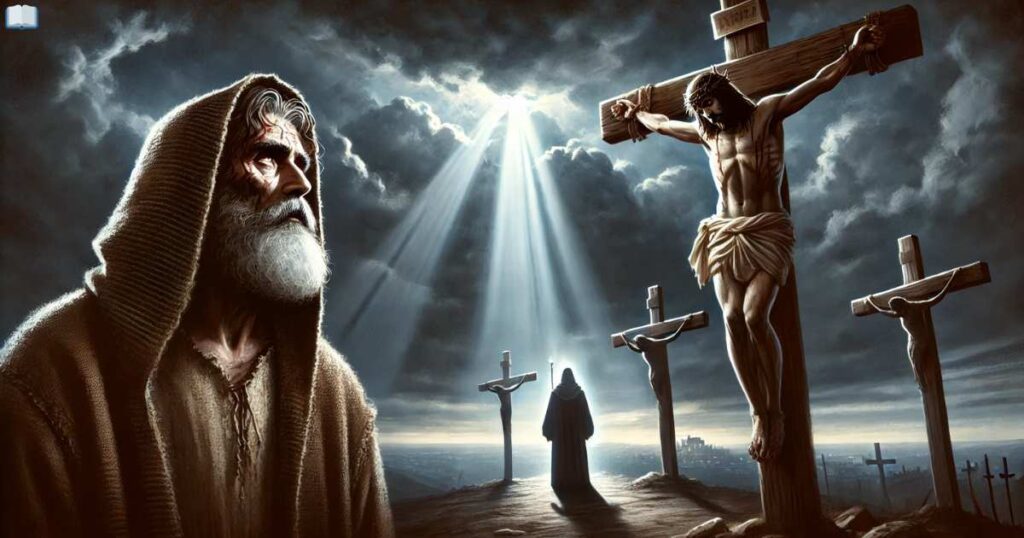Life is full of struggles, and the Bible doesn’t shy away from addressing brokenness. Brokenness in the Bible isn’t just about suffering—it’s about how God meets people in their lowest moments and restores them with His grace. Whether you’re feeling lost, discouraged, or simply seeking wisdom, Scripture offers powerful reminders of God’s presence and redemption.
Throughout the Bible, we see how God uses brokenness to bring about growth, healing, and transformation. While the Bible may not use the word “brokenness” explicitly in every instance, it is filled with stories of people who encountered deep trials yet found hope through faith. This article will explore 15 astonishing examples of brokenness in the Bible, revealing how God’s love and strength shine through even the darkest times. Let’s dive into these inspiring scriptures and discover the beauty of God’s restoration!
1. Adam and Eve: The Fall from Grace

Genesis 3:6-7 – When the woman saw that the fruit of the tree was good for food and pleasing to the eye, and also desirable for gaining wisdom, she took some and ate it. She also gave some to her husband, who was with her, and he ate it. Then the eyes of both of them were opened, and they realized they were naked; so they sewed fig leaves together and made coverings for themselves.
Adam and Eve’s choice to disobey God marked the beginning of human brokenness. Their decision led to spiritual separation, shame, and hardship. This single act introduced sin into the world, changing humanity’s relationship with God forever. However, even in their fall, God provided a promise of redemption.
Genesis 3:15 – And I will put enmity between you and the woman, and between your offspring and hers; he will crush your head, and you will strike his heel.
This verse is known as the first prophecy of salvation, foretelling the coming of Jesus, who would ultimately defeat sin and restore the broken relationship between humanity and God. Despite their failure, Adam and Eve’s story serves as a powerful reminder that God’s grace and redemption were in motion from the very beginning.
2. Cain and Abel: Fratricide and Consequences
Genesis 4:8-10 – Now Cain said to his brother Abel, “Let’s go out to the field.” While they were in the field, Cain attacked his brother Abel and killed him. Then the Lord said to Cain, “Where is your brother Abel?” “I don’t know,” he replied. “Am I my brother’s keeper?” The Lord said, “What have you done? Listen! Your brother’s blood cries out to me from the ground.
Cain’s jealousy and anger led to the first recorded murder, a tragic example of brokenness caused by sin. Instead of mastering his emotions, Cain let bitterness control him, leading to a devastating consequence. This act not only cost Abel his life but also resulted in Cain’s separation from God’s presence.
Genesis 4:13-15 – Cain said to the Lord, “My punishment is more than I can bear. Today you are driving me from the land, and I will be hidden from your presence; I will be a restless wanderer on the earth, and whoever finds me will kill me.” But the Lord said to him, “Not so; anyone who kills Cain will suffer vengeance seven times over.” Then the Lord put a mark on Cain so that no one who found him would kill him.
Even in judgment, God showed mercy. He did not allow Cain to be killed but marked him for protection. This story highlights both the consequences of sin and God’s unwillingness to abandon even those who fall. It serves as a warning against letting sin take control but also as a reminder of God’s enduring mercy.
3. The Story of Job: Trials and Faith

Job 1:21-22 – “The Lord gave and the Lord has taken away; may the name of the Lord be praised.” In all this, Job did not sin by charging God with wrongdoing.
Job’s story is one of immense suffering and unshakable faith. He lost his wealth, his health, and even his children, yet he refused to curse God. His friends assumed his suffering was due to sin, but Job remained steadfast, seeking answers from God rather than turning away in bitterness.
Job 42:10 – After Job had prayed for his friends, the Lord restored his fortunes and gave him twice as much as he had before.
Despite his trials, Job’s faith was rewarded. God restored what was lost and blessed him abundantly. His story teaches that brokenness is not always a sign of God’s punishment but can be a test of faith, leading to deeper spiritual growth and restoration.
4. Noah and the Corrupt World: A Fresh Start
Genesis 6:5-8 – The Lord saw how great the wickedness of the human race had become on the earth, and that every inclination of the thoughts of the human heart was only evil all the time. The Lord regretted that he had made human beings on the earth, and his heart was deeply troubled. So the Lord said, “I will wipe from the face of the earth the human race I have created.” But Noah found favor in the eyes of the Lord.
The world had become so corrupt that God decided to cleanse it through a great flood. Humanity’s brokenness had reached its peak, yet amidst the darkness, Noah stood as a beacon of righteousness. He obeyed God’s command to build an ark, preserving life and allowing a fresh start for creation.
Genesis 8:20-22 – Then Noah built an altar to the Lord and, taking some of all the clean animals and clean birds, he sacrificed burnt offerings on it. The Lord smelled the pleasing aroma and said in His heart: “Never again will I curse the ground because of humans, even though every inclination of the human heart is evil from childhood.”
This passage reveals God’s mercy and faithfulness. Though brokenness existed, God chose to preserve humanity and promise never to destroy the earth in such a way again. Noah’s obedience led to renewal, showing that God’s plans for restoration are always greater than judgment.
5. David and Bathsheba: Adultery and Redemption
2 Samuel 11:2-5 – One evening David got up from his bed and walked around on the roof of the palace. From the roof, he saw a woman bathing. The woman was very beautiful, and David sent someone to find out about her. The man said, “She is Bathsheba, the daughter of Eliam and the wife of Uriah the Hittite.” Then David sent messengers to get her. She came to him, and he slept with her.
David’s sin of adultery with Bathsheba led to a series of devastating consequences, including the arranged murder of her husband, Uriah. His failure as a leader and as a man after God’s own heart shows how even the most faithful can fall into sin. However, true brokenness is not in failure, but in refusing to repent.
Psalm 51:10 – Create in me a pure heart, O God, and renew a steadfast spirit within me.
David’s heartfelt prayer of repentance in Psalm 51 reveals the power of confession and seeking God’s mercy. Though his actions had dire consequences, God forgave him and continued to use him for His divine purpose. This story reminds us that no sin is too great for God’s redemption when one truly repents.
See More: 21 Heartfelt Prayers For Lost Love To Come Back
6. Moses: Self-Doubt and Leadership Struggles

Exodus 4:10-12 – Moses said to the Lord, “Pardon your servant, Lord. I have never been eloquent, neither in the past nor since you have spoken to your servant. I am slow at speaking and tongue.” The Lord said to him, “Who gave human beings their mouths? Who makes them deaf or mute? Who gives them sight or makes them blind? Is it not I, the Lord? Now go; I will help you speak and will teach you what to say.”
Moses, chosen to lead Israel out of slavery, struggled with deep insecurities. He doubted his ability to speak and lead, yet God reassured him that He would provide the strength needed. Moses’ brokenness did not disqualify him from being used by God.
Exodus 14:21-22 – Then Moses stretched out his hand over the sea, and all that night the Lord drove the sea back with a strong east wind and turned it into dry land. The waters were divided, and the Israelites went through the sea on dry ground.
Despite his initial doubts, Moses became one of the greatest leaders in biblical history. His story is a testament that God equips those He calls, even when they feel unqualified.
7. Peter’s Denial of Jesus: Loyalty Tested
Luke 22:61-62 – The Lord turned and looked straight at Peter. Then Peter remembered the word the Lord had spoken to him: “Before the rooster crows today, you will disown me three times.” And he went outside and wept bitterly.
Peter, one of Jesus’ closest disciples, swore loyalty but failed when it mattered most. His denial of Christ in a moment of fear showed the weakness of human nature. Yet, his brokenness was not the end of his story.
John 21:17 – The third time He said to him, “Simon son of John, do you love me?” Peter was hurt because Jesus asked him the third time, “Do you love me?” He said, “Lord, you know all things; you know that I love you.” Jesus said, “Feed my sheep.”
Jesus’ restoration of Peter shows that failure does not disqualify us from God’s plan. Peter’s brokenness led to deep humility, and he later became one of the strongest voices for the early church.
8. The Prodigal Son: Return and Forgiveness
Luke 15:17-24 – “But while he was still a long way off, his father saw him and was filled with compassion for him; he ran to his son, threw his arms around him and kissed him.”
The story of the prodigal son illustrates the brokenness of rebellion and the power of redemption. The younger son squandered his inheritance on reckless living, but when he hit rock bottom, he chose to return home. Instead of rejection, he was met with overwhelming love from his father.
Luke 15:32 – “But we had to celebrate and be glad, because this brother of yours was dead and is alive again; he was lost and is found.”
This parable reflects God’s heart for His lost children. No matter how far we stray, He is always ready to welcome us back with open arms.
9. Paul: From Persecutor to Apostle

Acts 9:1-5 – Meanwhile, Saul was still breathing out murderous threats against the Lord’s disciples. He went to the high priest and asked him for letters to the synagogues in Damascus, so that if he found any there who belonged to the Way, whether men or women, he might take them as prisoners to Jerusalem. As he neared Damascus on his journey, suddenly a light from heaven flashed around him. He fell to the ground and heard a voice say to him, “Saul, Saul, why do you persecute me?”
Before he became the apostle Paul, Saul was one of the greatest persecutors of Christians. His brokenness came from spiritual blindness—he thought he was serving God, but he was actually fighting against Him.
Acts 9:17-18 – Then Ananias went to the house and entered it. Placing his hands on Saul, he said, “Brother Saul, the Lord—Jesus, who appeared to you on the road as you were coming here—has sent me so that you may see again and be filled with the Holy Spirit.” Immediately, something like scales fell from Saul’s eyes, and he could see again. He got up and was baptized.
Paul’s transformation is one of the most powerful examples of how God redeems broken people. From a persecutor of Christians, he became one of the greatest apostles, writing much of the New Testament and spreading the gospel across the world. His story shows that no one is too far gone for God’s grace.
10. Elijah: Despair and Renewal
1 Kings 19:4 – He came to a broom bush, sat down under it and prayed that he might die. “I have had enough, Lord,” he said. “Take my life; I am no better than my ancestors.”
Elijah was a mighty prophet who had just experienced a great victory against the prophets of Baal, yet he fell into deep despair when Jezebel threatened his life. His story shows that even the strongest believers can face moments of deep discouragement.
1 Kings 19:11-12 – The Lord said, “Go out and stand on the mountain in the presence of the Lord, for the Lord is about to pass by.” Then a great and powerful wind tore through the mountains and shattered the rocks before the Lord, but the Lord was not in the wind. After the wind there was an earthquake, but the Lord was not in the earthquake. After the earthquake came a fire, but the Lord was not in the fire. And after the fire came a gentle whisper.
God did not rebuke Elijah for his despair but instead met him in a quiet whisper, renewing his strength and mission. This story reminds us that in our lowest moments, God’s presence is near, often in the stillness rather than in grand displays of power.
11. The Woman Caught in Adultery: Grace Over Judgment
John 8:3-7 – The teachers of the law and the Pharisees brought in a woman caught in adultery. They made her stand before the group and said to Jesus, “Teacher, this woman was caught in the act of adultery. In the Law, Moses commanded us to stone such women. Now what do you say?” They were using this question as a trap, in order to have a basis for accusing Him. But Jesus bent down and started to write on the ground with His finger. When they kept on questioning Him, He straightened up and said to them, “Let any one of you who is without sin be the first to throw a stone at her.”
The religious leaders sought to condemn, but Jesus offered grace. Instead of casting judgment, He challenged them to examine their own sins.
John 8:10-11 – Jesus straightened up and asked her, “Woman, where are they? Has no one condemned you?” “No one, sir,” she said. “Then neither do I condemn you,” Jesus declared. “Go now and leave your life of sin.”
Jesus did not excuse her sin, but He offered mercy and a new path forward. This story reveals that God’s grace is greater than our failures, and He desires transformation, not condemnation.
12. The Thief on the Cross: Redemption at the Last Moment

Luke 23:39-43 – One of the criminals who hung there hurled insults at him: “Aren’t you the Messiah? Save yourself and us!” But the other criminal rebuked him. “Don’t you fear God,” he said, “since you are under the same sentence? We are punished justly, for we are getting what our deeds deserve. But this man has done nothing wrong.” Then he said, “Jesus, remember me when you come into your kingdom.” Jesus answered him, “Truly I tell you, today you will be with me in paradise.”
The thief on the cross had nothing left to offer—no good deeds, no time to make amends. Yet, in his final moments, he recognized Jesus as Lord, and that simple faith was enough for salvation.
His story proves that it’s never too late to turn to God. No matter how broken someone is, God’s grace is available until the very end.
13. Jesus: Broken for Our Salvation
Isaiah 53:5 – But he was pierced for our transgressions, he was crushed for our iniquities; the punishment that brought us peace was on him, and by his wounds we are healed.
The ultimate example of brokenness leading to redemption is found in Jesus Himself. He was mocked, beaten, and crucified—though He was innocent—so that we could be saved.
Matthew 27:46 – About three in the afternoon Jesus cried out in a loud voice, “My God, my God, why have you forsaken me?”
In this moment of deepest agony, Jesus took on the weight of sin so that humanity could be restored to God. His suffering was not in vain; through His death and resurrection, we are offered new life.
John 16:33 – “I have told you these things, so that in me you may have peace. In this world, you will have trouble. But take heart! I have overcome the world.”
Jesus’ story reminds us that brokenness is not the end—God’s power brings healing, restoration, and victory.
14. The Woman Caught in Adultery: Mercy Over Judgment
John 8:10-11 – “Jesus straightened up and asked her, ‘Woman, where are they? Has no one condemned you?’ ‘No one, sir,’ she said. ‘Then neither do I condemn you,’ Jesus declared. ‘Go now and leave your life of sin.'”
This story highlights Jesus’ compassion for the broken. The woman was brought before Him to be condemned, but instead of judgment, He offered mercy and grace. While others sought to shame and punish her, Jesus demonstrated God’s love by forgiving her and encouraging her to change. This reminds us that no matter how broken we feel, God’s grace is always greater than our failures.
15. The Thief on the Cross: Redemption in the Final Hour
Luke 23:42-43 – “Then he said, ‘Jesus, remember me when you come into your kingdom.’ Jesus answered him, ‘Truly I tell you, today you will be with me in paradise.'”
The thief on the cross had lived a sinful life, yet in his final moments, he turned to Jesus in faith. Despite having no time to make amends, Jesus assured him of salvation. This story is a testament to God’s mercy—proving that no one is beyond redemption. It reminds us that salvation is not about what we do but about God’s grace through faith.
See More: 20 Prayers for Baseball: Elevate Your Game with Divine Guidance!
Conclusion
The Bible is filled with stories of brokenness, yet each one reveals God’s grace, redemption, and power to restore. Unveiling 15 Astonishing Examples of Brokenness in the Bible shows that no failure is too great for His mercy. These examples remind us that even in our lowest moments, God is always ready to heal and uplift us.
Whether it’s Jonah running from his calling, Peter denying Jesus, or the prodigal son returning home, each story highlights God’s unwavering love. No matter our struggles, He offers forgiveness, guidance, and a new beginning. Brokenness is not the end—it’s an opportunity for God to work in our lives.
FAQ’s
1. What does the Bible say about brokenness?
The Bible teaches that brokenness is not the end but a path to God’s grace. Many biblical figures experienced trials, yet God restored them.
2. How can I find hope in my brokenness?
By trusting in God’s promises, praying, and reading His Word, you can find peace and healing, just as those in the Bible did.
3. Which Bible verse is best for overcoming brokenness?
Psalm 34:18 – “The Lord is close to the brokenhearted and saves those who are crushed in spirit.” This verse reassures us of God’s presence.
4. Why does God allow brokenness in our lives?
God uses brokenness to shape us, draw us closer to Him, and strengthen our faith, just as He did with Job, David, and Peter.
5. Can God still use me despite my broken past?
Yes! Many biblical figures had troubled pasts, yet God transformed their lives for His purpose. No one is beyond His redemption.

My name is Razzaq, and I have been writing about Bible verses and prayers for a long time. My deep understanding of these topics allows me to create high-quality content. The information I provide is always 100% accurate, ensuring that readers receive reliable and valuable insights.

